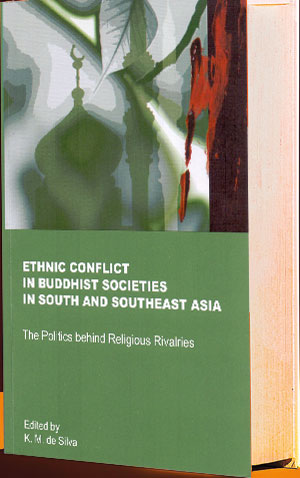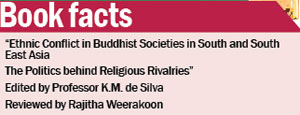Can a religion be protected by violating its own precepts?
View(s): It is a compendium of essays which provides evidence of the continuous search for the underlining factors for the ethnic conflict while sending a warning that if these remain unsolved, it could lead to a repetition of events of the past. And in the discussions which are on a delicate subject, the well-balanced and frank views expressed, well illustrate that this is an issue that needs to be in constant focus.
It is a compendium of essays which provides evidence of the continuous search for the underlining factors for the ethnic conflict while sending a warning that if these remain unsolved, it could lead to a repetition of events of the past. And in the discussions which are on a delicate subject, the well-balanced and frank views expressed, well illustrate that this is an issue that needs to be in constant focus.Skilfully edited by K.M. de Silva, eminent historian and professor of Sri Lanka History (1969-1995) at Peradeniya University, the essays he has published were opposing views on the ethnic conflict presented by a group of scholars from Sri Lanka and abroad. The views emerged during a conference held in 2014 titled “Twenty five years in Retrospect: Buddhism, Ethnic Conflict and Religious Harmony in South and South East Asia” and covered three Theravada Buddhist countries – Burma, Thailand and Sri Lanka.
The Conference organised by the International Centre for Ethnic Studies (ICES) was the second held after 1988. With the end of the separatist war and the emergence of a thriving South Asian democracy in Sri Lanka the ICES felt the need to hold another – a task which the academic leadership of the ICES found challenging as it had to take a hard and unsentimental look at Buddhism as a factor in the prolonged ethnic dispute.
John Clifford Holt, Professor of Humanities in Asian Studies and follower of developments in Sri Lanka has cited economic, linguistic and educational opportunities as factors in the conflict and not religion. But he attributes militancy and politicisation of segments of the Buddhist clergy for the Sinhala Buddhist/Tamil Hindu/Muslim/Christian rivalries that broke into violence in confined areas.
What drew the Buddhist clergy into politics – a development which has caused concern among those who follow moderation as taught in Buddhist Teachings and which has been roundly discussed in these essays. P.D. Premasiri, Emeritus Professor of Pali Studies sees it as the hardening of attitudes of the LTTE and their acts of terror which turned even moderate opinion among the Sinhala majority against Tamils. Buddha rejected war as a solution to human problems and associated armed conflicts with moral evils. He says “one of the inviolable virtues of a monk laid down in the basic precepts is refraining from destruction of life making monks to become soldiers of peace and not instigators of war.”
But Professor Holt states that the experience of war has led to the articulation of a disposition that is in absolute opposition to Buddhist Teachings. The perpetration of violence constitute the first parajika or cardinal moral precept. There had however been sections of the clergy which had rejected war as a solution. Holt quoted from a dissertation of researcher Frydenlund who had conducted interviews with monks who had experienced the horrors of war. These monks who had lived in viharas in close proximity to the fighting between Tigers and the forces in the North and the East had been almost unanimous in their assertions that the war fundamentally aggravated the causes of the ethnic conflict and did not in any way ameliorate them.
More aspects had been discussed as to the factors that drove monks into politics.
Asanga Tilakaratne, Professor of Pali Buddhist Studies of the Colombo University had held that it was a response to Tamil extremism. Refuting Professor Premasiri’s theory that the sole objective of the Sangha is to follow the path to Nirvana, Professor Tilakaratne has stated that as any social institution, the Sangha too had changed. Not to recognize that change means to function on an idealist plane.
He however had hastened to add that this does not mean that monks can bypass the Teachings of the Buddha. Citing Ven Walpola Rahula Thera, he had shown historical evidence to establish that monks did emerge in political activism. In the context of Ven. Walpola Rahula Thera however, history may provide justification. But he says, it does not constitute the sole criterion for such behaviour.
Professor Tilekaratne had thrown a challenge to Sinhala Bhikkhus when he asked whether they had left room for Tamils to become Buddhists? Their historical mistrust of Tamils had kept them away from becoming Buddhists and this should be a matter of concern for them to admit that there is no Tamil Buddhist community in Sri Lanka. Atrocities perpetrated on Bhikkhus and Buddhist sacred places by the LTTE however must have added to this situation. Yet, he had asked, should Bhikkhus persist in continuing a negative attitude towards the Tamil community?
His contention is that misguided activism of some of the bhikkhus is a post victory development. It has made them think that they have the liberty to use physical power to vanquish what they perceive as “threats” to Buddhism. The crucial issue is whether it is possible to protect a religion by violating its own precepts?
The 30-year war left behind scars of animosities, tension, distrust and fear which were fundamentally due to human folly. But Professor Premasiri had pointed out that principles found in abundance in the Buddhist ideology could be used to educate the masses, heal the scars and resolve the conflict.

Ven. Mahinda Deegalle, Professor of Humanities, Colgate University, New York had referred to the refined, tolerant culture and society that had prevailed in the Kandyan kingdom during the last five centuries where Buddhist principles of loving-kindness enabled people to relate to strangers more effectively. He gave instances as to how Muslims established themselves as a religious minority in Sinhala areas as well as Catholics and Christian missionaries who were settled in the Kandyan kingdom when they were persecuted under foreign invaders in the coastal areas.
Although the publication included essays on religious rivalries of Burma and Thailand as well, this review confined the discussion to matters pertaining to Sri Lanka.


